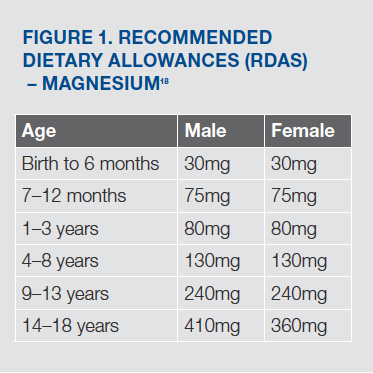Magnesium is a critical biological element for human health; it is the second most abundant electrolyte within the cells after potassium and the fourth most common mineral in the human body after calcium, potassium and sodium.[1,2]
An electrolyte of chief physiological importance, cells die without adequate magnesium.[3,4] Low levels also adversely affect over 300 enzyme systems involved in protein synthesis, muscle, hormone, bone and nerve function and blood glucose control, along with energy, DNA and RNA production.[1] Magnesium is also required for intracellular homeostasis, the activation of vitamin B1 and the utilisation of other important nutrients, such as calcium, potassium, zinc, iron and vitamin D5.
These are all crucial factors needed in the growth, development and neurological wellbeing of children. Unfortunately, magnesium deficiency is a common and widespread problem. If left untreated, it will inevitably lead to metabolic dysregulation and many physical and mental health concerns.[1]
Magnesium is crucial for healthy mood and bone development in kids
Magnesium is necessary for the conversion of vitamin D into its active form, which in turn supports calcium absorption and metabolism, and parathyroid hormone function required for bone growth and development.[1] With around 52% of the magnesium stores located in the bone and approximately 40% of peak bone mass accumulated by adolescence, the best time to influence bone mass is in the early years; therefore, optimal magnesium levels are especially important for children.[6] Additionally, adult studies show that higher magnesium levels correlate with higher bone mineral density (BMD).[1]
Magnesium is also important for calm moods and relaxation in children. It is a natural N-methyl-D-aspartate (NMDA) antagonist and a gamma-aminobutyric acid (GABA) agonist, both of which have a calming and relaxing effect, as well as facilitating sleep.[1] Therefore, a deficiency in magnesium can increase agitation, anxiety, irritability, hyperexcitability, attention and aggression problems in children.[8]
Stress, whether physical, or emotional increases the need for magnesium.[1] Additionally, when stressed the body releases magnesium from the cells, increasing its potential for excretion and further creating a deficiency state.[1]
One study showed dietary magnesium intakes are inversely associated with externalising behaviour problems, such as aggression and attention issues, in adolescents.[8] Deficiencies have also been recorded in children with attention deficit hyperactivity disorder (ADHD) and autism spectrum disorders (ASD).[1],[6]
The reasons for childhood magnesium deficiencies
There is insufficient data on the level of magnesium deficiency specifically in children; however, it is estimated that at least 42% of young adults have an ongoing magnesium deficiency.[1] The main cause of deficiency in humans is inadequate intake but with children the requirements are increased because of constant growth and development.[9]
Because balancing magnesium levels relies heavily on adequate intake it is often difficult to attain adequate levels in children. Even though magnesium is found in a variety of foods, its highest sources are from seeds, nuts, green vegetables, wholegrains and legumes, which are foods often not regularly eaten by children.[1]
Additionally, many factors affect both the intake and absorption of magnesium, and it will be readily excreted from the body if these conditions are not being met.[5]
Lack of adequate magnesium intake
Children that are the most prone to magnesium deficiencies are the ‘picky eaters’ and those on low fibre, low vegetable, restricted, highly processed or nonorganic diets and any child with eating or sensory disorders.
The foods commonly eaten foods by children, such as meat and refined carbohydrates (e.g. white flour in breads, baking and crackers etc.) provide less than 20% of the daily requirement of magnesium, as processing can lower the magnesium content in grains by up to 300-400%.[1] Other foods, such as root vegetables, fruits, oils and fats contribute very little magnesium to the diet.[10]
Food processing at home, as in the cooking and boiling of vegetables, can also result in significant magnesium losses.[1]
Additionally, the quality of the soil and farming practices are also a factor in obtaining an adequate daily intake of magnesium. Certain modern fertilisation and agricultural techniques have led to soils depleted of minerals, without replenishment.[1] This is evident in Australia with many parts of Victoria and NSW having magnesium deficient pasture soils.[1] Organic meats and vegetables may also be a consideration with some commonly used pesticides in nonorganic foods, including glyphosate, able to chelate minerals, and potentially reduce soil magnesium content.[1]
A lack of mineralised water, due to overall reduced water intake or from only drinking demineralised water, may also contribute to magnesium insufficiency.[1]
Diets high in sugar, salt and soft drinks
Consuming soft drinks, which can be high in phosphoric acid, increases the depletion of magnesium.[6] These drinks may also replace the intake of water, and without adequate hydration the body will excrete more magnesium to retain the salinity of the urine, as it does with sodium. A high salt diet will also increase magnesium excretion.[5]
Soft drinks are often high in sugar too, which is detrimental to both magnesium stores and retention, with data showing that magnesium is depleted in a diet high in sugar. Magnesium is essential for carbohydrate metabolism and both the manufacture and action of insulin (insulin-mediated-glucose-uptake), with magnesium deficiency linked to type 2 diabetes and prediabetes. Both high blood glucose and insulin levels increase urinary magnesium excretion.[2],[4],[12]
Factors that reduce magnesium absorption
Absorption figures vary, but can be between 25% to 75%, depending on if the diet is magnesium rich or depleted.[10] Adequate absorption requires plenty of magnesium in the diet and nutrients, such as vitamin D, selenium and vitamin B6.[55] Factors that can hinder absorption also include:
- a low protein diet (data shows less than 30g/day for adults)[10]
- a high saturated fat diet [5]
- vitamin D deficiency, prevalent when consuming a western diet, and a lack of sunlight exposure[1][5]
- nutrient deficiencies[5]
- medications commonly given to children, such as antibiotics, inhaled corticosteroids, antihistamines and antacids.[1]
Other factors that increase magnesium losses
Very active children or those who sweat easily may require extra magnesium, as 10%-15% of the total magnesium excreted from the body is through sweat.[1] Increased losses will also be seen with prolonged diarrhoea, vomiting or excess renal excretion (seen in bowel disease, laxative use and diabetes).[1]
Prolonged, intense stress, worry and anxiety over school, friends, sports, and relationships, especially in the absence of magnesium-rich foods, increases elimination considerably, as do nutrient deficiencies such as selenium.[5]
Signs and symptoms that show kids may need extra magnesium:
- Twitching muscles, muscle tension, spasms (particularly in small muscles, such as the eye lid), leg cramps or growing pains
- Excessive worry, anxiety, irritability and panic attacks
- Restlessness and difficulty sleeping
- Difficulty maintaining attention, hyperexcitability and hyperactivity
- Teeth grinding
- Sensitivity to noise
- Muscular weakness and lethargy
- Constipation.[1],[6],[10],[13]
Conditions in children that may require magnesium supplementation:
- Attention deficit disorder (ADD) and ADHD[1]
- Anxiety and depression[1]
- Asthma[1]
- Atopic dermatitis[1]
- ASD[6]
- Cystic fibrosis[16]
- Diabetes[1]
- General behavioural difficulties, aggression and mood swings[5]
- Insomnia and sleep disturbances[1]
- Low gastric acid secretion[5]
- Muscle cramps/growing pains[1]
- Migraine headaches[1]
- Obesity and unfavourable blood lipid profiles[15]
- Physical performance[1]
- Pinworm/threadworm or giardia infestations[17]
- Prehypertension and hypertension[14]
- Recurrent bacterial and fungal infections[5]
- Restless leg syndrome[1]
- Stress[1]
- Tourette’s syndrome[5]
Adverse effects of magnesium in kids
When ingested within foods, magnesium has no toxicity risk or side effects.[10] With supplementation, the only side effect that may be seen is diarrhoea, which is classed as the first sign of excess intake (above 350mg/day). Reducing the dose or dividing the total daily amounts across the day will lessen this effect and maximise bioavailability.[6] Care may be required for children with renal impairment.[1]
Conclusion
Magnesium deficiency is linked to a range of clinical conditions, because of its crucial role in hundreds of essential biochemical pathways. As it is often difficult to encourage children to eat a wide and varied diet, it is important that all potential risks of deficiency are taken into account, with serious considerations for supplementation of this non-toxic mineral, if required. The half-life of magnesium is 42 days, so correcting deficiencies in children consuming inadequate levels, may require long-term supplementation.[1]
References
- Schwalfenberg GK, Genuis SJ. The importance of magnesium in clinical healthcare. Scientifica 2017:4179326, [Source]
- Mooren FC. Magnesium and disturbances in carbohydrate metabolism. Diabetes Obes Metab 2015;17(9):813-823. [Abstract]
- Feng H, Guo L, Gao H, et al. Deficiency of calcium and magnesium induces apoptosis via scavenger receptor bi. Life Sci 2011;88(13-14):606-612. [Abstract]
- Barbagallo M, Dominguez LJ. Magnesium and type 2 diabetes. World J Diabetes 2015;6(10):1152-1157.[Abstract]
- Johnson S. The multifaceted and widespread pathology of magnesium deficiency. Med Hypotheses 2001;56(2):163-170.[Abstract]
- Braun L, Cohen M. Herbs & natural supplements- an evidence- based guide, 4th ed. Chatswood: Elsevier Australia, 2015. [Abstract]
- Seelig MS. Consequences of magnesium deficiency on the enhancement of stress reactions; preventive and therapeutic implications (a review). J Am Coll Nutr 1994;13(5):429-446. [Abstract]
- Black LJ, Allen KL, Jacoby P, et al. Low dietary intake of magnesium is associated with increased externalising behaviours in adolescents. Public Health Nutr 2015;18(10):1824-1830. [Abstract]
- Fawcett WJ, Haxby EJ, Male DA. Magnesium: physiology and pharmacology. Br J Anaesth 1999;83(2):302-320. [Abstract]
- Magnesium. Nutrient Reference Values for Australia and New Zealand. National Health and Medical Research Council, 2014. Viewed 7 Feb 2018, [Source]
- Bioag. Magnesium deficiency. Viewed 7 Feb 2018, [Source]
- Lin C-C, Tsweng G-J, Lee C-F, et al. Magnesium, zinc, and chromium levels in children, adolescents, and young adults with type 1 diabetes. Clinical Nutrition 2016;35(4):880-4. [Abstract]
- Rogers S. 3 Tips for recognizing magnesium deficiency in your children. Nutritional Magnesium Association. Viewed 7 Feb 2018, [Source]
- Guerrero-Romero F, Rodríguez-Morán M, Hernández-Ronquillo G, et al. Low serum magnesium levels and its association with high blood pressure in children. The Journal of Pediatrics 2016;168:93-88.e1. [Source]
- Zaakouk AM, Hassan MA, Tolba OA. Serum magnesium status among obese children and adolescents. Egyptian Pediatric Association Gazette 2016;64(1):32-37. [Full Text]
- Gontijo-Amaral C, Guimarães EV, Camargos P. Oral magnesium supplementation in children with cystic fibrosis improves clinical and functional variables: A double-blind, randomized, placebo-controlled crossover trial 1–3. The American Journal of Clinical Nutrition 2012;96(1):50-56. [Abstract]
- Olivares JL, Fernández R, Fleta J, et al. Serum mineral levels in children with intestinal parasitic infection. Digestive Diseases 2003;21(3):258-261. [Abstract]
- Magnesium - Fact sheet for health professionals. National Institute of Health, Office of Dietary Supplements, 2016. Viewed 7 Feb 2018, [Source]
DISCLAIMER:
The information provided on FX Medicine is for educational and informational purposes only. The information provided on this site is not, nor is it intended to be, a substitute for professional advice or care. Please seek the advice of a qualified health care professional in the event something you have read here raises questions or concerns regarding your health.





